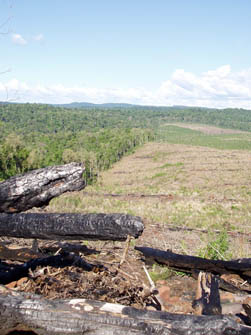Following the trends in forest loss
by Dan Ryan
 Those who work in conservation have an ingrained belief that the world's great forests are shrinking.
Those who work in conservation have an ingrained belief that the world's great forests are shrinking.
But a recent study shows the data available is so poor that making any assumptions at all is problematic. Alan Grainger from Leeds University in the UK has been analysing UN data stretching back nearly 30 years and found that "evidence for a decline is unclear".
Dr Grainger acknowledges large scale deforestation has taken place, but also says there is evidence that in some countries, forests are expanding spontaneously. He urges the creation of a World Forest Observatory to monitor precisely the changes in the forest cover and avoid this kind of argument over ambiguous data sets.
Meanwhile in Brazil the latest interim government figures show a fall of 20% in Amazon destruction between August 2006 and July 2007. This is the third year running there has been a fall, but these followed a disastrous year for the forest in 2004.
However, the figures still make gloomy reading. Over 11,000 sq km of forest was destroyed, or using the obligatory small country measurement, an area the size of Jamaica. Deforestation in the tropics is undoubtedly tied to the market values of the crops that take the place of the forest. So when there is an increase in the price of soya and beef there could be a correlating rise in the levels of destruction. And the problems don't end there. WWF estimate that a combination of climate change and deforestation could destroy or severely damage 55% of the Amazon by 2030.
It is imperative heavily forested countries are incentivised to protect these green oceans. The Kyoto treaty gave no reward or recognition to those who protected forests and if these forest losses are to be stemmed it is vital that this madness ends. Perhaps, post Bali, we can look to a brighter future. For what good is cutting emissions while we are still cutting the trees?